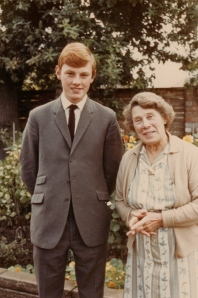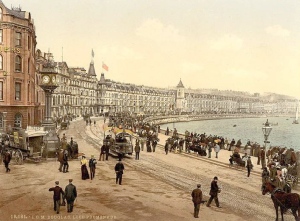In Part 1, I explored how my Uncle Terry’s death was the basis for the murder that Kate Galway must solve in my first book. But Uncle Terry wasn’t the only relative of mine to withdraw from our family. And I believe that the culmination of all of these people disappearing from my life influenced my decision to write mystery novels.
Terry’s son, my cousin Terry, was someone with whom I spent many summers in England and Wales when I visited my mother’s family. After he left school, he took his father’s place in the family business. He was a part of our lives until his early twenties when he had a falling out with our grandmother and simply walked away. I’ve tried Googling him, searching through UK voters’ records, and writing to every Terry Raymond Davies of a certain age. The last piece of information I have is that he once served in the air force. Hopefully he’s been enjoying a full life: walking the dog on rainy afternoons, spending holidays in the sun, and cheering on the local football team with his children and grandchildren. Or he could have died years ago. We may never know. We continue to search.
My grandfather’s only sister, Marie, didn’t disappear but rather withdrew to the Isle of Man. In a story worthy of a romance novel, my grandfather fell in love with my grandmother when he heard her singing at a concert for World War I servicemen. The only problem was that he was already engaged to a friend of his sister. Marie was apparently quite upset when he broke off the engagement to marry my grandmother. Was this the reason she moved away? In the last picture I have of her, she is holding me as a baby. Much later, she surprised me with a money order for my 21st birthday. Just as Kate wonders about the life of her aunt, I have often wondered about the life of my great-aunt of whom I know almost nothing.
I do know that Marie never married. There is nothing unusual in this as many women of both war generations remained unmarried due to the toll the fighting took on the young men. This is reflected in the lives of some of the older women living on my island, including one who lost her fiancé to the Battle of Britain.
So how did Marie support herself? Did she become a school teacher, work in an office, or was she given money or a share in the family business, thus enabling her to live a life of respectable independence? When Marie died in 1974, she left her estate to her “female companion.” These were my mother’s words. Older women living on their own, and if they could afford it, would often engage younger women to help them and keep them company: a combination a personal assistant and caregiver. There is a tradition of literary ladies’ companions extending into the 20th century. Perhaps the most famous was Rebecca. In Daphne du Maurier’s 1938 novel of the same name, Rebecca is the companion to a rich American woman vacationing in Monte Carlo. Through her employer, Rebecca meets and marries wealthy widower Maxim de Winter, becoming the tortured mistress of Manderley.
But what about Marie’s companion? At the time of my great-aunt’s death, I thought it unusual that she would leave her entire estate to a woman who was essentially her employee, with nothing passed onto the family. Was my mother’s use of the word “companion” an euphemism for a relationship of which she did not approve?
In my novel, Hannah Sutherland, who had been the teacher of both Emma and Kate, planned to leave the island to set up a home with her lover Fliss. But at the last minute, she can’t go through with it. Did I unconsciously have Hannah plan to retreat from the family who could neither approve nor condone her lifestyle because that is what I suspected my great-aunt had felt forced to do?
My life and my books have been influenced by my curiosity about all of these people: an uncle I never knew, a great-aunt I barely knew, and a cousin I knew and then lost.
My family history partially explains why I am attracted to the mystery genre which is at its heart a search for an understanding of both events and the motives for people’s actions. By choosing to write traditional British mysteries, to write about everyday people, I seem to have made this search personal.
As with most writers, my way of coming to terms with the world is through storytelling, and many readers see Kate Galway as my fictional alter ego. Like me, Kate has had family members go missing, including her father and of course Emma. Her investigation into Emma’s death becomes a personal quest to connect with this woman she never knew and to understand who Emma was and why she was murdered. And through this process, Kate learns about herself.
When Kate had set out to learn the truth about Emma’s death, she had unconsciously viewed Emma as an extension of herself because they’d shared the same ambitions and desires. Naively Kate had expected Emma to have reacted to situations as she would, and it had shocked her when that hadn’t happened. It would take some time for Kate to come to terms with exactly who Emma was.
It does make me wonder how I’d feel if I were ever to uncover the truth of my missing relatives’ lives.



Leave a comment